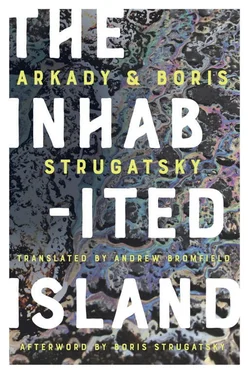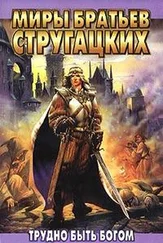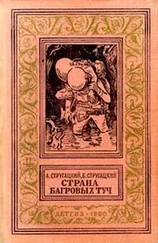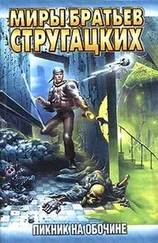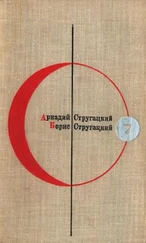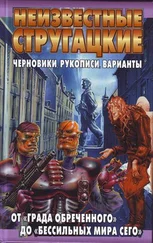They were the tracks of bare feet. Someone had come down off the ridge and walked into the water. Someone with large, broad feet, someone heavy, pigeon-toed and clumsy—definitely humanoid, but with six toes on each foot. Grunting and groaning, he had scrambled down the ridge, hobbled across the sand, plunged into the radioactive water with a splash, and swum, wheezing and snorting, to the opposite bank, into the rushes. All without removing his high, white collar.
Everything on all sides was suddenly lit up by a bright blue flash, like a lightning strike, instantly followed by rumbling, hissing, and crackling above the ridge. Maxim jumped to his feet. Dry earth came pouring down the ridge, and something shot up into the sky with a threatening screech, fell into the middle of the river, and sent up a fountain of spray mingled with white steam. Maxim started swiftly running up the slope. He already knew what had happened, he just didn’t understand why, and he wasn’t surprised when, at the spot where his ship had just been standing, he saw a swirling column of incandescent smoke, a gigantic corkscrew ascending into the phosphorescent vault of the heavens. The ship had burst, and its ceramite shell was flickering with a purple glow; the dry grass around it was merrily burning, the bushes were blazing, and smoky little flames were catching hold of the gnarled trees. The furious heat struck Maxim in the face, and he shielded himself with his open hand, backing away along the ridge—first one step, then another, then another, and another… He inched backward, keeping his watering eyes fixed on the magnificent beauty of this incandescent torch, this sudden volcano, scattering its crimson and green sparks, and the senseless frenzy of the rampaging energy.
No, it’s obvious why, he thought in dismay. A big monkey showed up, saw I wasn’t there, climbed inside, and raised the deck. I don’t even know how to do that, but the monkey figured it out—it was a very quick-witted monkey, with six toes. Anyway, it raised the deck… What do we have in there, under the deck in our ships? Anyway, it found the batteries, took a big rock—and wham! A very big rock, weighing about three tons, and it took a swing… An absolutely massive, mega-huge kind of monkey… And it made a total wreck of my ship with its cobblestone—two hits up there in the stratosphere already, and now one down here too… An incredible story; I don’t think anything like that has ever happened before. But what am I supposed to do now? They’ll miss me soon enough, of course, but even when they do miss me, they’re not very likely to believe that such a thing is possible—the ship has been destroyed but the pilot is still in one piece. What’s going to happen now? My mother… My father… My Teacher…
He turned his back to the conflagration and walked away, moving quickly along the river. Everything around him was illuminated by red light, and his shadow on the grass in front of him kept shortening and lengthening by turns. On his right a sparse forest began, smelling of decaying leaves, and the grass turned soft and damp. Two large nocturnal birds cacophonously shot up from right under his feet and fluttered away, low above the water, toward the far bank. He fleetingly thought that the fire might overtake him and then he would have to escape by swimming, and that would be really obnoxious. Then the red light on all sides faded and went out completely, and he realized that, unlike him, the fire-fighting devices had finally figured out what had happened and performed their designated function with their usual dependable thoroughness. He vividly pictured to himself the smoke-blackened, half-melted cylinders, absurdly jutting up amid the blazing debris, belching out dense clouds of pyrophage and feeling very pleased with themselves.
Calmly now, he thought. The important thing is not to do anything rash. There’s plenty of time. In fact, I’ve got heaps and heaps of time. They can search for me for all eternity; the ship’s gone and it’s impossible to find me. And until they understand what happened, until they’re absolutely certain, they won’t tell my mother anything. And I’ll come up with something or other here.
He passed by a small, cool swamp, scrambled through some bushes, and came out onto a road, an old, cracked concrete road that ran off into the forest. Stepping over the concrete slabs, he walked to the edge of the ridge and saw the rusty girders, overgrown with creepers—the remains of some large latticework structure, half immersed in the water. And on the far bank he saw the continuation of the road, barely distinguishable under the glowing sky. Apparently there had once been a bridge here. And apparently someone had found this bridge a nuisance and had knocked it down into the river, which had not rendered it either more beautiful or more convenient. Maxim sat down on the edge of the ridge and dangled his legs. He carefully scrutinized his inner condition, reassured himself that he wasn’t doing anything rash, and started thinking.
I’ve found the main thing I need. There’s a road right here. A bad road, a crude road, and, what’s more, an old road, but nonetheless a road, and on all inhabited planets roads lead to those who built them. What else do I need? I don’t need food. That is, I could eat a bit, but that’s just my primeval instincts at work, and we’ll suppress them for now. I won’t need water for at least a day and a night. There’s plenty of air, although I’d prefer it if the atmosphere contained less carbon dioxide and radioactive filth. So I don’t have any basic physical needs to appease. But I do need a small—in fact, to be honest, a quite primitive little—null-transmitter with a spiral circuit. What could be simpler than a primitive null-transmitter? Only a primitive null-battery. He squeezed his eyes shut, and the circuit of a transmitter based on positron emitters immediately surfaced out of his memory. If he had the components, he could assemble the little doodad in a jiffy, without even opening his eyes. He mentally ran through the assembly process several times, but when he opened his eyes, there was still no transmitter. There wasn’t anything.
Robinson Crusoe, he thought with a strange feeling of curiosity. Maxim Crusoe, that is. Well, well—I don’t have a thing. Just shorts with no pockets and a pair of sneakers. But I do have an island, an inhabited one. And since the island is inhabited, there’s always hope that I might find a primitive null-transmitter. He earnestly attempted to think about a null-transmitter but didn’t manage it very well. He kept seeing his mother all the time, as she was being informed, “Your son has disappeared without a trace,” and the expression on her face, and his father rubbing his cheeks and confusedly looking around, and how cold and empty they felt… No, he told himself. Thinking about that isn’t allowed. Anything else at all but not that, otherwise I’ll never get anything done. I command and forbid. Command myself not to think about it and forbid myself to think about it. No more. He got up and set off along the road.
The forest, initially timid and sparse, gradually grew bolder, advancing closer and closer to the road. Several small, impudent young trees had already smashed through the concrete and were growing right there in the roadway. The road was obviously several decades old, or at least it had been several decades since it was used. The forest at the sides rose higher and higher, growing thicker and thicker, and in places the branches intertwined above Maxim’s head. It got dark, and loud, guttural whoops started ringing out in the thickets, now on the left, now on the right. Something in there was stirring about, rustling and trampling. At one point something squat and dark, hunched down low, ran across the road about twenty steps ahead of him. Gnats droned.
Читать дальше
